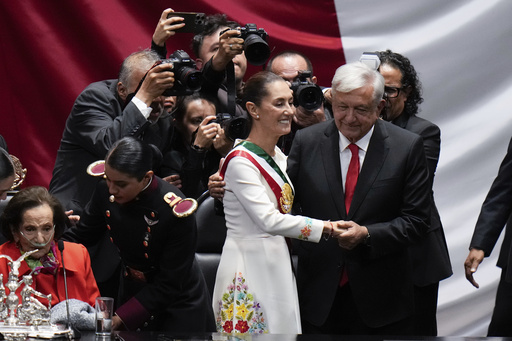
BANGKOK — In a notable trend observed this year, unhappy voters have significantly impacted sitting governments across the globe, marking what many are referring to as a “super year” for elections.
This year, approximately 70 nations, representing nearly half the world’s population, went to the polls, resulting in major losses for incumbents. A recent example was Donald Trump’s victory in the U.S. presidential race, adding to a series of defeats for existing political parties in 2024.
The reasons behind this voter discontent are diverse; however, a common thread is the pervasive dissatisfaction that emerged following the COVID-19 pandemic. Citizens and businesses continue to grapple with challenges such as high inflation, limited government resources, and an increase in migration.
According to Richard Wike, who directs global attitudes research at the Pew Research Center, there is a widespread feeling of disconnect between the electorate and political elites, transcending ideological barriers. A survey by Pew revealed that the allure of democracy seems to be waning, as voters express rising economic hardships and a sentiment that no party genuinely represents their interests.
Wike emphasized that various factors contribute to this unrest, with economic concerns and inflation playing a significant role. Since the onset of the pandemic in 2020, political incumbents have faced removal in 40 out of 54 elections held in Western democracies. Political scientist Steven Levitsky from Harvard University highlighted this trend as indicative of a profound disadvantage for incumbents.
In the UK, the Conservative Party suffered its worst electoral outcome since 1832, returning the Labour Party to power after 14 years. Simultaneously, far-right parties disrupted longstanding governing parties in France and Germany during elections for the European Union Parliament. This trend prompted French President Emmanuel Macron to call for a parliamentary election in an attempt to counteract the growing influence of far-right factions. The National Rally party initially performed well but ultimately secured third place after alliances in the second round, leading to a fragile administration.
In Asia, the ruling conservative People Power Party in South Korea was defeated in parliamentary elections by a coalition of liberal opposition parties led by the Democratic Party. In India, despite expectations of a straightforward victory, Prime Minister Narendra Modi’s Bharatiya Janata Party lost its majority in parliament, though it managed to retain power through alliances. Likewise, Japanese Prime Minister Shigeru Ishiba’s Liberal Democratic Party, which has dominated Japanese politics for decades, faced unexpected losses in recent elections but remained in governance.
Political analysts have noted that voters have used these elections to voice frustrations, including those stemming from scandals and dissatisfaction with governance. Paul Nadeau, adjunct assistant professor at Temple University in Tokyo, pointed out that the actions in Japan exemplify voters expressing their long-standing frustrations in light of a corruption scandal involving the ruling party.
Across the globe, it’s a challenge to draw clear conclusions regarding this trend. Observers like Rob Ford of the University of Manchester have emphasized that inflation has spurred an unprecedented wave of anti-incumbent sentiment. There may also be broader reasons linked to the long-term ramifications of the pandemic, including health issues and educational disruptions.
In South Africa, prolonged unemployment and inequality have contributed to a marked decline in support for the African National Congress, which had been in power for 30 years. Following May’s elections, the party lost its parliamentary majority for the first time, compelling it to forge coalitions with rivals. Meanwhile, in countries with authoritarian regimes, the voting patterns present a mixed picture.
Nevertheless, in democratically robust nations like South Africa, Senegal, and Botswana, signs of a shift in governance are evident. In Botswana, for instance, voters ousted a party that had held power for 58 years. Alex Vines from Chatham House noted that the electorate is increasingly feeling the pressures of rising living costs, along with a generational shift in perspective that distances voters from historical events like decolonization and apartheid.
In Latin America, Mexico stands out as an anomaly in this anti-incumbent trend. Andrés Manuel López Obrador, limited to one term, endorsed Claudia Sheinbaum for succession, and she won the presidency in June. Pew’s survey indicated that voters in Mexico expressed a degree of satisfaction with economic conditions, bucking the global trend.
However, recently elected officials have not escaped voter scrutiny. British Prime Minister Keir Starmer’s approval ratings have dropped significantly as citizens demand lower prices and improved public services while remain skeptical of political promises. Ford raised a fundamental issue for democracy: if voters, eager to hold governments accountable, are swift to pass harsh judgments, it diminishes the incentive for governments to strive for better performance.
The electoral landscape has shifted dramatically, involving high-profile victories and losses for political figures like Trump, who was initially elected in 2016, lost in 2020, and recently won again, defeating Kamala Harris after President Biden withdrew from the race. This outcome is emblematic of the ongoing conservative populist movement, yet it underscores the broader risks faced by politicians globally. Nadeau suggested that political analysts may have misinterpreted global electoral behaviors, viewing them through the lens of ideological shifts rather than recognizing an inherent anti-incumbent trend.
As the electorate continues to express its discontent in various ways, the implications for future governance remain uncertain.
